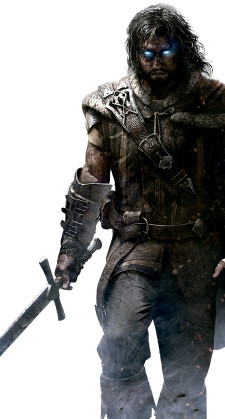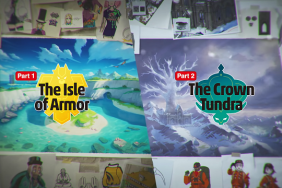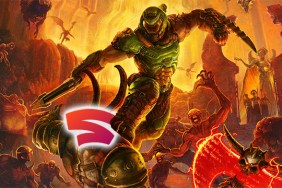I’ve read The Hobbit and at least the first 50 pages of the first novel in the Lord of the Rings trilogy. That makes me criminally under equipped to discuss the nuances of Tolkien’s world and writing, but I think it also plants me somewhere above Harry Potter fanatics in diehard science fiction and fantasy circles. I can speak to the general metaphor present at the heart of Lord of the Rings, but I couldn’t tell you the names of any of Bilbo’s cousins in the shire. In fact, that kind of detail is exactly why I left the movie-print trilogy of Lord of the Rings novels to collect dust.
Lord of the Rings didn’t follow me to college and it certainly didn’t encapsulate what I hoped to accomplish with an English degree. In fact, Lord of the Rings remains more useful to me as a touchstone of nerd culture than it does a world to escape into so with that in mind I was surprised to enjoy Middle-earth: Shadow of Mordor as much as I did, returning to it to try the challenging Test of Power and the game’s latest DLC in Lord of the Hunt.
Neither of the downloadable content packs available for Middle-earth really push the envelope when it comes to expanding content, but Warner Bros. Games smartly melds gameplay modifications with the satisfying combat and traversal loops that made up most of Shadow of Mordor. Here’s how that’s incredibly important when creating new DLC for games in this industry:
- Downloadable content has to provide value to both the consumer and the creator in a way that fools both into thinking it actually matters in the marketplace. A lot of publishers will say that their products launch and then follow up with plenty of downloadable content such that it keeps the user engaged throughout a full year, as opposed to a three or four month period. This means DLC has to be extremely cheap to produce and actually deliver.
- Downloadable content shouldn’t be required to experience everything the game has to offer and at least in Middle-earth’s case, that is absolutely true. There’s a huge wealth of content in the game and to that end, most consumers will find that they’re perfectly fine going without. You can kill tons of monsters, mounting beasts or running across fields by feet if you so choose, all without paying more than the sticker price. Downloadable content should extend, not replace or refill truncated pieces of gameplay.
- Downloadable content also has to create at least a slightly new gameplay loop that doesn’t exist within the original piece of software.
In Middle-earth’s case, the best example of this is in the previously mentioned Test of Power DLC that asks the user to, rather than plot out a lengthy campaign of violence between opposing camps of orcs, rush down a few Orc war chiefs and captains. Rushing from camp to camp or from mission to mission means that the player has to have a dedicated sense of the target and the ultimate goal. Time becomes an incredibly important factor and players have to assess whether or not success is defined by a mission complete notification or a really fast time.
I love games that do this when they can be really successful at it because they often seem to stumble into the gameplay more than they do make a point of it before launch. That’s easily the biggest problem with DLC in modern video gaming, given the way new missions or modes are marketed to the consumer well before the content is even ready. While these things do affect sales, they also influence the end user in a very strange way. Consider the following sequence of actions and ask yourself if you think video gaming could continue to sustain itself if it happened repeatedly:
- Before you walk into your local game shop, you see a poster outside that alerts you to a season pass promotion adding four new maps to a multiplayer shooter game within two months of launch.
- You enter the game shop and ask the employee behind the counter if he or she knows what the new maps will consist of. Will there be a jungle level or a space level? Will the maps do anything differently when the user has already played the game for two months and explored other maps made available at launch?
- Before you leave this game shop, we’ll sustain hypothetically that you in fact preorder the game and the season pass, leaving roughly $80 at a store without a product in tow when you exit.
- The game launches. It’s terrible and you hate it. You can’t completely return the product because you’ve opened it and now that transaction would fall under a second-hand type of sale. Further, you’ve already invested more than the asking price by paying for the season pass up front and that content waits a full two months out. Now, on some emotional level you know what you’ve invested in the game and on a financial level I guarantee you that at least 50% of customers who preorder games also think about their purchase in the weeks and months leading up to release.
By now, you probably already understand the emotional and mental build up towards an exciting, highly engaging product that some consumers have already been so convinced of its awesomeness that they actually start telling their friends about how great something is going to be before they’ve experienced it.
Doesn’t that sound like preadolescent views of sexual activity in some way? How much do we really invest emotionally in the purchase of a game? I have and will continue to say that video games provide an intensely satisfying means of escapism, particularly one I feel is far more trustworthy as it resonates with people on the level of a great book or movie, but I can’t say that players should put so much behind things like the purchase of a game as they certainly don’t do the same with books in the modern age.
Middle-earth’s downloadable content flies in the face of this criticism in a key way that ultimately calls back to the core value proposition of DLC in and of itself. Middle-earth’s downloadable content has released slowly after launch and it adds no spatial component to the game. Instead, it uses the existing gameplay systems to bring new challenge, new methods of play, and a new means of exploring what the player is capable of doing in the game world. It doesn’t just offer up a new map, it offers a means of learning how to really exploit the game’s mechanics.
- Players will find that they become more adept at the sprint function in-game.
- Players will find that they become more skilled at combat such that enemies no longer pose such dangerous threats.
- Players will find that they get better at manipulating the character up walls and over other impediments to progress.
- Players will find that there’s a huge trail of dead orcs laying behind them.
At least in Shadow of Mordor, I think downloadable content presents a means of actually accomplishing what a product should for the end-user consumer in video gaming: it makes the original product more entertaining. There’s certainly the possibility of exploitation in this space, particularly when downloadable content exists in any form on a disc shipped and sold to the consumer before release, but I’m not technical enough to know whether or not downloadable content has to be prepared for so consistently.
I’m not averse to DLC in any way and to that end I’d hope game companies continue to experiment with how they serve the customer well after launch. Should multiplayer maps be included in retail pricing or should a new character open up new campaign missions too? Where video games are concerned, I think the base product needs to speak for itself up front. Let DLC make it even better afterward.











